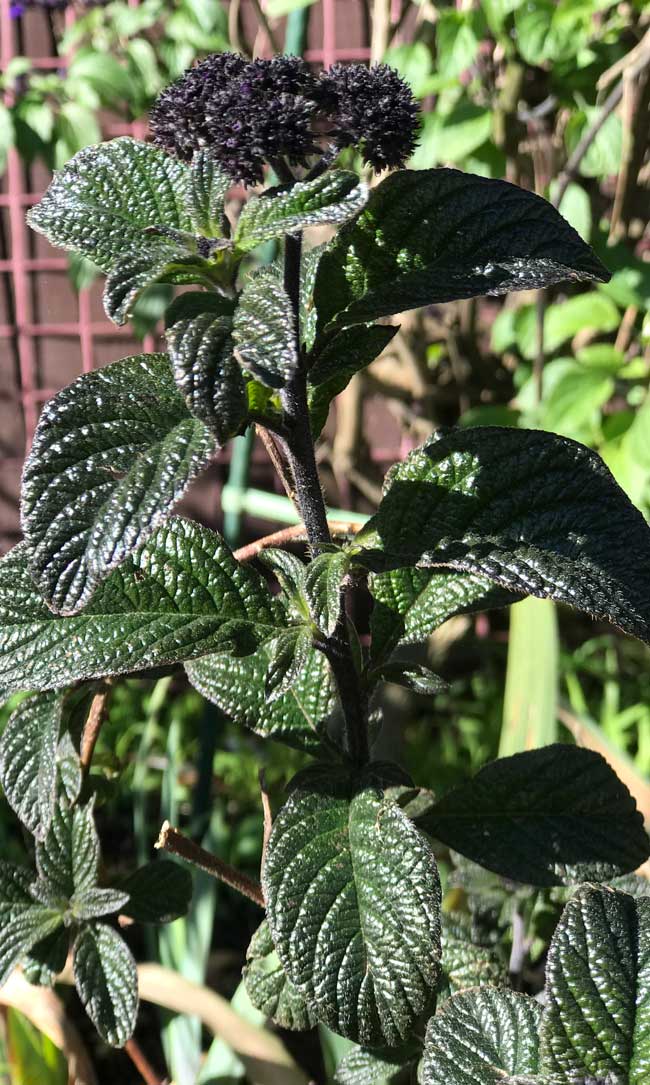Kia ora, this week we have a guest writer on the blog…Chris Taylor’s adventures on holiday
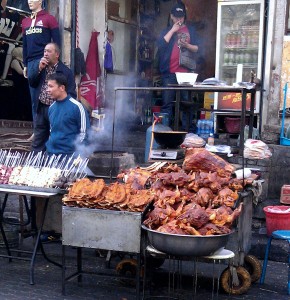 I woke up in Turpan around 7:30 on Day Three or Four with the hotel room windows wide open and the birds singing in the grape vines. It was still dark because they’re on Beijing time there. Technically it was about 5 am but Beijing doesn’t make concessions for time difference. Everything must be standard. Consequently daybreak last week was around 7:30-8:00 and nightfall was around 9:00 pm. At least in Turpan some of the street roads are named after Uigher heroes or places but in Urumqi they all reference Chinese people, rivers or whatever. Colonisation is completed in this way. Think Shakespeare Road; Tennyson Street.
I woke up in Turpan around 7:30 on Day Three or Four with the hotel room windows wide open and the birds singing in the grape vines. It was still dark because they’re on Beijing time there. Technically it was about 5 am but Beijing doesn’t make concessions for time difference. Everything must be standard. Consequently daybreak last week was around 7:30-8:00 and nightfall was around 9:00 pm. At least in Turpan some of the street roads are named after Uigher heroes or places but in Urumqi they all reference Chinese people, rivers or whatever. Colonisation is completed in this way. Think Shakespeare Road; Tennyson Street.
There were no mosquitoes that morning, not even a fly which is an upside to life in this dry, arid land. Life was perfect at least until the Chinese tourists somewhere in the hotel started clearing their throats and spitting because they smoke so much and then other guests started moving around in their bathrooms and making bathroom noises. Thin walls.
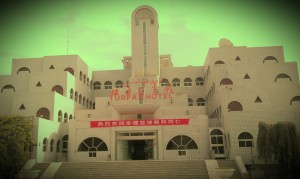 I was a little hungover after drinking beer in John’s Cafe the previous night, and then later at a bar on the sidewalk near the hotel with a sad, drunken Uigher who insisted on joining me; actually the first beer since Otaki. After I got rid of the drunk I went for a walk around town and finished the night with a plate of what they call ‘ban mian’ (noodles with vegetables) and lamb skewers and got back to the hotel and and fell asleep with the TV on until I awoke at some stage and turned it off.
I was a little hungover after drinking beer in John’s Cafe the previous night, and then later at a bar on the sidewalk near the hotel with a sad, drunken Uigher who insisted on joining me; actually the first beer since Otaki. After I got rid of the drunk I went for a walk around town and finished the night with a plate of what they call ‘ban mian’ (noodles with vegetables) and lamb skewers and got back to the hotel and and fell asleep with the TV on until I awoke at some stage and turned it off.
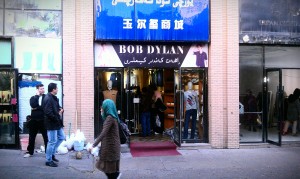 Turpan’s an oasis supported for centuries with an inventive underwater irrigation system which serves as both water supply and tourist attraction these days and that was, when I went, crowded with tourists and unbearable. The ancient mud city of Jiaohe was more accessible and interesting. It covered a wider area and is the site of an ancient settlement (circa 600 AD) made with mud – the remains of temples, walls, houses and roads. The temples were Buddhist. The Uighers were Islamicised quite recently after experiencing an number of religious beliefs.The mud city and the water wells were actually the only tourist sights I bothered to visit apart from the Uigher museum in Urumqi some days later which had loads of artefacts recovered from cemeteries in the area and told their story from paleolithic to modern. For me, the whole place is a museum. The structures in Jiaohe were roofless and weathered but it doesn’t take too much imagination to see the current architecture roofless, withered, and people-less. Who will be visiting them in 200 years’ time?
Turpan’s an oasis supported for centuries with an inventive underwater irrigation system which serves as both water supply and tourist attraction these days and that was, when I went, crowded with tourists and unbearable. The ancient mud city of Jiaohe was more accessible and interesting. It covered a wider area and is the site of an ancient settlement (circa 600 AD) made with mud – the remains of temples, walls, houses and roads. The temples were Buddhist. The Uighers were Islamicised quite recently after experiencing an number of religious beliefs.The mud city and the water wells were actually the only tourist sights I bothered to visit apart from the Uigher museum in Urumqi some days later which had loads of artefacts recovered from cemeteries in the area and told their story from paleolithic to modern. For me, the whole place is a museum. The structures in Jiaohe were roofless and weathered but it doesn’t take too much imagination to see the current architecture roofless, withered, and people-less. Who will be visiting them in 200 years’ time?
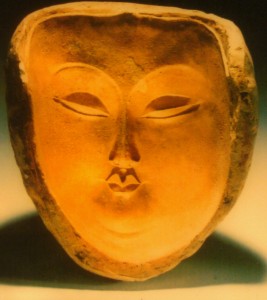 Urumqi is a bigger city. The trees are deciduous and the weather is cool. I wore the same pair of shorts the whole seven days but the locals were all rugged up for some reason. It must get really cold in the winter. I wonder what they wear then. Big coats, fur hats, thermals made from animal hide. The city landscape is standard Chinese. There’s not much Silk Road about it these days apart from the Grand Bazaar which is really where the locals shop. It’s their Mall although in this city there are two cultures and they shop in different areas and buy different things. It is the beginning of Asiatic culture after all. You know they’re people like you but they think differently, pray differently, have different ideas about dress, food, family, life and so on and it starts about here and ends in Turkey. But what strikes you first – or struck me – was that this city is just like any other Chinese city. Bit by bit the Arabic language signs make an impression and signify a difference and there is some Uigher architecture – mosques and turrents – but not much.
Urumqi is a bigger city. The trees are deciduous and the weather is cool. I wore the same pair of shorts the whole seven days but the locals were all rugged up for some reason. It must get really cold in the winter. I wonder what they wear then. Big coats, fur hats, thermals made from animal hide. The city landscape is standard Chinese. There’s not much Silk Road about it these days apart from the Grand Bazaar which is really where the locals shop. It’s their Mall although in this city there are two cultures and they shop in different areas and buy different things. It is the beginning of Asiatic culture after all. You know they’re people like you but they think differently, pray differently, have different ideas about dress, food, family, life and so on and it starts about here and ends in Turkey. But what strikes you first – or struck me – was that this city is just like any other Chinese city. Bit by bit the Arabic language signs make an impression and signify a difference and there is some Uigher architecture – mosques and turrents – but not much.
Both the fruit and food are not up to much although people in Guangzhou seem to have the impression that they are. It’s accepted wisdom. It’s mostly grapes at this time of the year which are then dried. The grapes I bought didn’t taste very nice or seem espcially fresh and the rest of the fruit on display was quite ordinary and unappealing. Living where I do in Guangzhou I’m only a few hundred meters from better fruit and a Uigher immigrant population with their food specialties that are superior in quality and taste to what I saw in Xinjiang. They kill the sheep on the street and the carcasses are hung and butchered in public view but they do that in Guangzhou too. Not a great deal of hygiene. The lamb is mutton. There is no distinction in China which means that ‘yangrou’ (tranlated as ‘lamb’) can be tough and stringy as opposed to fresh and tender and there’s a lot of fat included in what they call meat – on the skewers and in the stews. They had grenadine juice everywhere (pomegranate juice) which is expensive and has kind of dry, bitter taste but that’s everywhere in Guangzhou too and cheaper. The yoghurt was good and cheap.
People are quite poor and streets are dirty (as usual) and the little restaurants that are everywhere look filthy from outside so you can only imagine what the kitchens out back must look like. There’s repitition too – it’s beef noodles, or chicken rice, or lamb kebabs, one after another. The local bread shops sell bread baked inside a hole like oven and it’s dry and crispy and the last kind of bread I would eat let alone buy despite the fact that my favorite bread these days is Arab style flat bread. The Chinese have their own bakeries with their soft, bland breads and creamy cakes loaded with additives that suit their taste.
At the moment, due to the threat of terrorism, security is everywhere from special armed forces to police to security guards stationed in tanks or amoured vehicles, in battle formation behind barriers on the street and at the entrances to all bus stops, restaurants hotels and any public place. It’s quite unsettling having your bag checked or scanned all the time but there’s a reason for it.
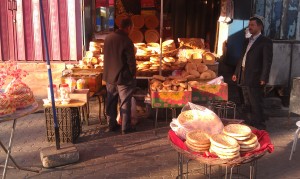 I walked everywhere. In fact, that was my vacation – walking. I reasoned that the exercise would do me good. I tried to visit the Heavenly Lake but the car park entrance was packed with buses, cars and people and I couldn’t be bothered be a part of a horde queuing up to buy yet another ticket to to go somewhere to buy another ticket and I turned around and went back to Urumqi. It was the Chinese National Day Holiday and accordingly there were Chinese tourists everywhere in groups like an ‘old soldiers never die’ group that I noted and others with a guide carring a colored flag on a stick so their members didn’t get lost or confused with another group and organising the process with megaphones.
I walked everywhere. In fact, that was my vacation – walking. I reasoned that the exercise would do me good. I tried to visit the Heavenly Lake but the car park entrance was packed with buses, cars and people and I couldn’t be bothered be a part of a horde queuing up to buy yet another ticket to to go somewhere to buy another ticket and I turned around and went back to Urumqi. It was the Chinese National Day Holiday and accordingly there were Chinese tourists everywhere in groups like an ‘old soldiers never die’ group that I noted and others with a guide carring a colored flag on a stick so their members didn’t get lost or confused with another group and organising the process with megaphones.
Turpan was much more relaxed by comparison and almost lived up to the image of a Silk Road town in my imagination. I bumped into Zunun at the Urumqi bus station and he took me from Urumqi to Turpan by car in a (fast and foolish) ride along the highway which was again very busy and included one huge traffic jam caused by a major accident where two vehicles and a huge truck had collided (fast and foolish) leaving one guy apparently dead and sprawled out on his back on the highway looking up at heaven to where his soul was no doubt headed while the police who had managed to make it to the scene were standing around smoking and ignoring him.
I stayed in the Turpan Hotel because it’s foreigner-friendly. It’s rundown although from the outside but inside the foyer it retains some charm. It seems to be kept going without much reason for keeping going. There is dust accumulating everywhere. Some vehicles were parked up and covered in dust as if the owners had disappeared quite some time ago and were unlikely to ever return and nobody cared about that anyway. The grape vines – that are everywhere in Turpan anyway – were dusty and untended. Qingnian Street – which means ‘youth’ or ‘young people’ – is the main drag of Turpan. It’s a pedestrian (mostly) boulevard covered with tiled arches with grapes growing overhead so it’s quite pretty but at the same time quite dusty and no one seems to notice or care. The grapes have all been picked as of now except for bunches directly overhead which are unreachable.
The hotel had John’s Cafe for the foreigners (a kind of ex-hippie franchise) and a Chinese restaurant for the Chinese tourists and an Islamic restaurant for the Muslims. They were all likewise jaded and waiting for an end. Business wasn’t booming – it was just making it from day to day. There were mostly baby boomers in John’s, ending their overland trips along the silk road from Turkey, one day an Australian group, the next, German, and a few stragglers, a couple of hippies drinking water, gaunt and thin like heroin addicts, and me. They were all getting online, trading shares, reading email or news websites or otherwise talking, dissing the food, the guides and gossiping a little about the other groups they were travelling with. I sat there sending messages on WeChat. I got online via my phone and changed my Skype account details. Magic, smartphone life, on a now silk-less road.
I went back to Urumqi a couple of days later and finished the vacation walking and walking around the city having firmly ditched the idea of the mountain trek and the Khazak yurt overnighter. You could say the lesson is never to travel in China during the National Day Holiday but you can say that about any time in China. I am back feeling refreshed and perhaps trim. I had the window seat on the five hour plane-ride back to Guangzhou (beef noodles, again) and the day was fine so I had a very memorable view of the vast landscape of China watching it change from snowy mountain range to desert to mountain to increasing inhabitation and finally snaking along the Zhujiang River back to Guangzhou where the plane circled directly above my residence and workplace before touching down. Nice.
Christopher L Taylor

